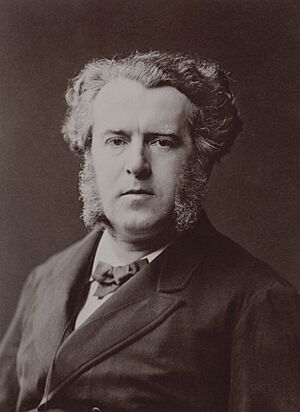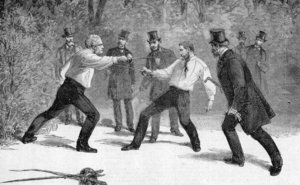Charles Floquet facts for kids
Quick facts for kids
Charles Floquet
|
|
|---|---|

Photograph c. 1870
|
|
| Prime Minister of France | |
| In office 3 April 1888 – 22 February 1889 |
|
| President | Sadi Carnot |
| Preceded by | Pierre Tirard |
| Succeeded by | Pierre Tirard |
| Personal details | |
| Born | 2 October 1828 |
| Died | 18 January 1896 (aged 67) |
| Political party | Republican Union |
| Spouse | Hortense Kestner |
Charles Thomas Floquet (born October 2, 1828 – died January 18, 1896) was an important French lawyer and politician. He served as the Prime Minister of France from 1888 to 1889. Floquet was known for his strong republican beliefs and his efforts to bring about change in France.
Contents
Charles Floquet's Life and Career
Early Years and Education
Charles Floquet was born in Saint-Jean-Pied-de-Port, France. His father was Pierre Charlemagne Floquet. His mother was Marie Léocadie Etcheverry. Her father was a deputy mayor. In 1869, Charles married Hortense Kestner. She was the daughter of a famous chemist and politician. Charles studied law in Paris. He became a lawyer in 1851.
Standing Up for His Beliefs
Even as a student, Floquet showed he believed in a republic. A "coup d'état" happened in 1851. This was a sudden takeover of the government. Floquet strongly opposed it. He became known for bravely speaking out against the government. He also wrote for important newspapers. In 1870, he spoke out against the Empire. This was during a trial involving Pierre Napoleon Bonaparte. Floquet also helped in the revolution of September 4. He then helped defend Paris.
A Diplomatic Incident
In 1867, a famous event happened in Paris. The Russian Emperor Alexander II visited the city. Many people say Floquet told the Emperor: "Vive la Pologne, Monsieur!" This means "Long live Poland, Sir!" It was very impolite to say this to a monarch. Especially since Russia controlled parts of Poland. Floquet himself said he only shouted "Vive la Pologne!" When the Emperor looked, another lawyer repeated the phrase. This showed support for Poland's freedom.
Entering Politics
In 1871, Floquet was elected to the National Assembly. This was France's main law-making body. During a time of conflict in Paris called the Commune, he tried to make peace. He formed a group to unite people. When his efforts failed, he left Paris. He was briefly put in prison. But he was soon released. He became an editor for a newspaper. In 1876, he was elected as a deputy. He became a leader among radical politicians.

Leading the Government
In 1882, Floquet briefly served as a prefect. This was a high-ranking official. In 1885, he became the president of the Chamber of Deputies. This was a very important role. He handled it so well that he was re-elected twice. He improved relations with Russia. This made him eligible for higher office. In 1888, he became the Prime Minister of France. He also served as Minister of the Interior. His government promised to change the constitution.
Facing Challenges
As Prime Minister, Floquet had to deal with General Boulanger. Boulanger was a popular general. He challenged the government. This led to heated arguments. On July 13, 1888, Floquet and Boulanger fought a duel. Boulanger was wounded. In February 1889, Floquet's government fell. This was over disagreements about changing the constitution. Floquet was re-elected president of the Chamber later that year.
Later Life and Legacy
Floquet's career faced challenges due to financial controversies. These events affected his reputation. He lost his position as president of the Chamber in 1892. He also lost his seat in the house in 1893. However, he was elected to the Senate in 1894. Charles Floquet passed away in Paris in 1896.
 | Sharif Bey |
 | Hale Woodruff |
 | Richmond Barthé |
 | Purvis Young |

